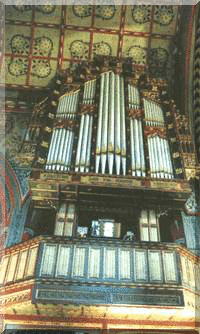|
This afternoon's recital is give
by
Melville Young, Director of the Festival music.
The programme is
devoted to works of two periods - the baroque era and
the contemporary
period of composition.
The organ at St. Salvador's was
built by
Wandsworth & Maskell of Leeds in 1882 - this being
their first
instrument in Scotland. In 1930, Rothwell of
Harrow cleaned the
instrument and added a Swell 4 foot reed and the Great
nineteenth. The organ, therefore, is at present
virtually in its
original form, possessing two manuals and pedals, some
twenty-two
speaking stops and the normal couplers. The
action is heavy
tracker throughout.
A word may be said concerning the
contemporary works to be performed. Arthur
Wills, a current
Cathedral Organist and a composer of forceful English
music is
represented by his Requiem Aeternam. Here we
find Wills in a more
reflective mood, but still utilising polytonality and
the whole-tone
scale.
The Messiaen work reveals the
composer's
characteristic mysticism. 'Apparition de
l'Eglise Eternelle' is
impressionistic in nature. Mr. Young feels that
this Vision of
the Eternal Church may well be intended to give the
hearer a glimpse of
things to come as they arise from the mists of
prophecy, stand clear
before our gaze and slowly fade until the time for the
New Heaven and
Earth arrives for mankind. He also feels that
there is an analogy
between this conception of the music and St. John's
vision in the
Apocalypse: "Behold, the tabernacle of God is with
men, and He will
dwell with them."
Biblical Sketch No. 2 by the
contemporary
American, Van Hulse, is a fair example of programme
music, depicting
Moses receiving the Decalogue. The commands of
God at the
beginning give way to a softer passage probably
portraying the peace
and calm of the holy mountain. The abrupt mood
change at the
close is in keeping with Moses' wrath on returning to
find the Children
of Israel in an idolatrous orgy. This brief
passage merges with
the final dignified phrases which may well represent
the solid
foundation which the Ten Commandments give to
Christian society.
The recital opens with the
Fantasia and
Fugue in A minor by Bach.
|
